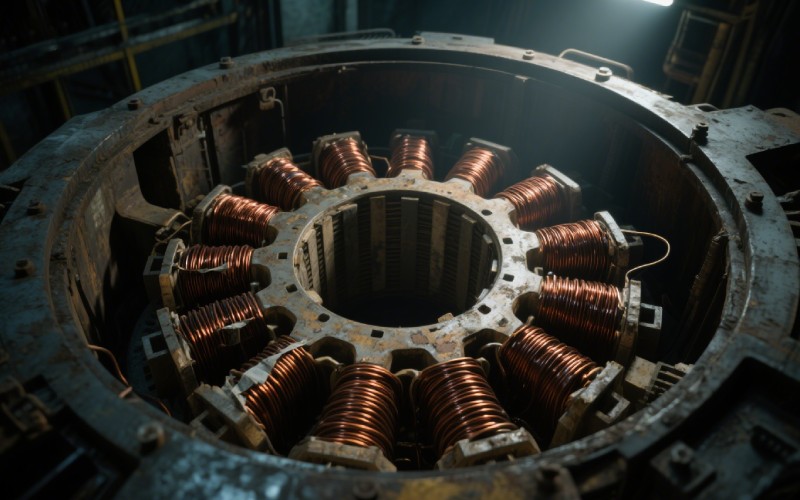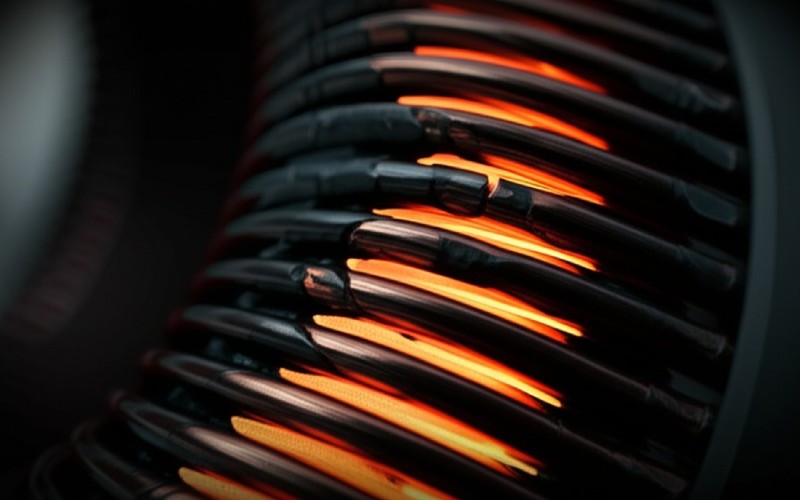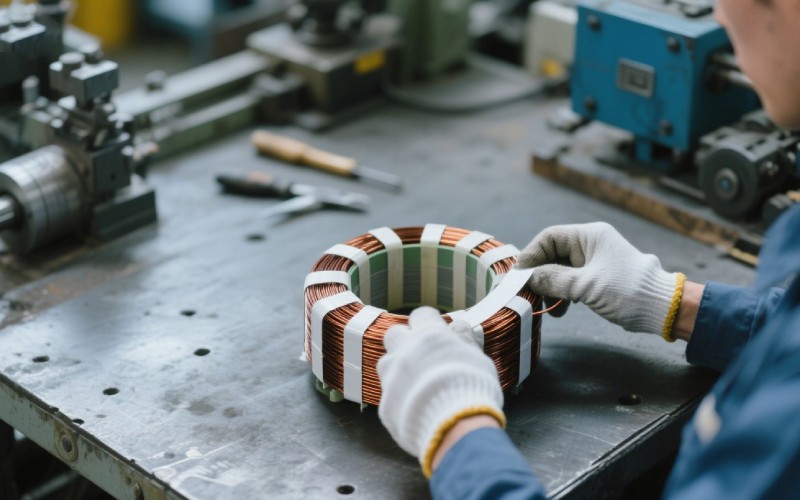Let Sino's Lamination Stacks Empower Your Project!
To speed up your project, you can label Lamination Stacks with details such as tolerance, material, surface finish, whether or not oxidized insulation is required, quantity, and more.

When a field coil fails, your whole operation can stop. This costs you time and money. In this article, I will explain the most common failures with a field coil. I will also share the best solutions to get your equipment running again. This guide will help you understand your machine better and make smart choices when you need a repair.
Let’s start with the basics. What is a field coil? Think of a field coil as a simple component with a very important job. It is a coil of wire, usually insulated copper wire, wrapped around a core. When electric current flows through this coil of wire, it creates a magnetic field. This magnetic field is critical. In a generator or motor, this field is what makes the machine work. It helps turn electrical energy into motion, or motion into electrical energy. Without a good magnetic field from the coil, the equipment will not function at all.
The main purpose of a field coil is to provide the excitation for a generator. It supplies the power needed to produce the strong magnetic field. Every large piece of rotating equipment, from a simple motor to a large generator, has some kind of coil inside. The health of this single coil is vital for the entire machine. A small problem in the coil can lead to a big failure. That is why understanding this component is so important for anyone in the industry. Our expertise is in making sure this critical coil is always working for you.
One of the most common failures is when a field coil starts to overheat. When a coil gets too hot, it is a sign of a serious problem. The main cause of an overheat is too much electrical current flowing through the wire of the coil. This can happen for various reasons. The equipment might be working too hard, or there might be a problem with the power supply. When the coil has to handle too much current, the wire gets hot. This heat is the enemy of the coil.
When the coil wire gets too hot, the insulation around the wire starts to melt or burn. This insulation is there to protect the wire and keep the electricity flowing where it should. When it is gone, the coil will fail. The result of an overheat is often a damaged coil that needs to be replaced. To prevent this, you must ensure the equipment is running correctly. An engineer can check your machine to ensure the coil is right for the job. A good coil design will handle the heat and workload. We offer a service to look at your coil and see if it can handle the job.

A “short” is another common failure. A short circuit happens when two wires in the coil touch each other when they should not. This usually happens after the coil has started to overheat and the insulation has melted away. When the bare wires touch, the electrical current takes a “short cut.” This causes a sudden, large flow of electricity in one small spot. This will break the circuit and stop the coil from working.
A short in a field coil can cause a lot of damage. The intense heat from the short can melt the copper wire itself. This can lead to a complete failure of the coil. Sometimes, you might notice an abnormal noise or a smell of burning before the equipment stops. This is a sign that the insulation is failing and a short might happen soon. If you suspect a short, you should stop the machine right away. A shorted coil cannot be fixed. The only solution is to replace the coil with a new one. This is a failure that needs a full replacement.
The insulation on the coil wire is maybe the most important part of the entire coil. It is a thin layer of non-conductive material that keeps the electrical current inside the wire. Over time, this insulation can break down. This is a very common cause of coil failure. The three biggest enemies of insulation are heat, age, and vibration. As a coil gets older, the insulation becomes brittle and can crack.
When insulation fails, it can cause a short, as we just discussed. Or it can cause a ground fault, which we will talk about next. An engineer can test the insulation resistance of a coil. This test tells us how healthy the insulation is. If the insulation resistance is too low, it means the insulation is weak and the coil is close to failure. The only solution for bad insulation is to replace the coil. You cannot repair old, brittle insulation. A new coil with modern, high-quality insulation will last much longer and handle more heat. This is a critical factor for a reliable coil.
Yes, it can. People often think of coil failures as purely electrical problems, but mechanical issues like vibration can be a major cause of failure. Large equipment always has some vibration when it runs. Over many years, this constant shaking can wear away at the insulation on the coil wire. It acts like sandpaper, slowly rubbing the protective layer off the wire. Once the insulation is gone, the coil will short out and fail.
This is a big problem in certain types of equipment, especially older DC motors. These machines often have carbon brushes. Carbon brush wear creates a fine, black carbon dust. This dust can get everywhere, including inside the field coil. Carbon dust is conductive, which means electricity can travel through it. If enough carbon dust builds up on a coil with weak insulation, it can create a path for electricity to flow where it shouldn’t. This can cause a short or another type of failure. Regular cleaning and maintenance can help, but a well-built coil with strong taping and insulation is the best defense. We design our custom coils to handle this kind of tough industry environment.
An “earth fault” or “ground fault” is another common type of coil failure. This happens when the electrical current from the coil wire finds a path to the metal body of the machine. The metal frame of the equipment is usually connected to the earth for safety, which is where the name comes from. This is a very dangerous type of short circuit. It means the entire metal machine could become live with electricity.
This failure is almost always caused by broken-down insulation. The live wire inside the coil touches the metal core it is wrapped around. Or, a wire comes loose and touches the frame. When this happens, safety devices should trip and shut down the equipment. Like other shorts, an earth fault produces a lot of heat and can cause serious damage to the coil and the machine. A simple test can check if a coil has an earth fault. If it does, the only safe solution is to replace the field coil. There is no simple repair for this kind of damage.
A repair is sometimes possible, but it depends on the type of damage. If the coil has very minor damage to the outer insulation, and the wire itself is not hurt, a repair might work. This could include a thorough steam cleaning to remove dirt and carbon dust, followed by baking the coil dry and applying a new coat of varnish. This can add a little more life to an old coil.
However, most field coil failures are too serious for a simple repair. If the coil has an internal short, an earth fault, or has been badly damaged by an overheat, a repair is not a good solution. Trying to patch up a badly damaged coil is often unsuccessful. The repair will not last, and the coil will fail again soon. In most cases, the best and safest solution is to replace the entire coil. This ensures you have a reliable piece of equipment.

When you need to replace a field coil, you have two main choices. You can have your old coil rewound, or you can get a new, custom coil. A rewound coil uses the original laminated steel cores from your old coil. The old, damaged wire is removed, and new wire is wound onto the old core. This can be a good option if the core is in good shape and the original design was good.
A custom coil, on the other hand, is built completely from scratch. This is often the better solution, especially for a critical piece of equipment. With a custom coil, we can improve the design. We can use better materials, like a higher grade of insulated copper wire and modern insulation. This means the new coil can handle more heat and will last longer. If the original coil failure was due to a poor design, a custom coil allows us to fix that problem. We can engineer a new coil to meet the specific needs of your industry and application. We partner with our customers to design the perfect custom coil for their project.
This is a great question, and it is something we take very seriously. When we create a custom coil, we don’t just copy the old one. We start with a thorough analysis. Our engineer will look at the failed coil to understand why it had a failure. We will ask you about the equipment and how you use it. Our goal is to design a new coil that is better than the old one. We want to ensure it can handle your real-world working conditions.
To ensure success, we use our expertise to make smart choices. We will select the right kind of wire and insulation material. We might change the way the coil is wound or how it is braced to resist vibration. We offer this detailed design service to all our customers. We want to be your long-term partner and support your project. We work with you to ensure the new coil design will not just work, but will work for a long time. Our expertise ensures you get a reliable coil.
The choice of material is one of the most critical factors in building a long-lasting field coil. A coil is a simple component, so the quality of its parts matters a lot. A low-quality coil might look fine, but it will not last. The two main materials are the copper wire and the insulation. Using a high-quality, pure copper wire ensures good electrical flow and less heat buildup.
The insulation material is even more important. Modern insulation materials are amazing. They can handle very high temperatures and are very tough. When we build a custom coil, we choose the best insulation to meet the demands of the job. This might be a special tape or varnish that can resist oil, moisture, and vibration. Using a better material might cost a little more at the start, but it saves you a lot of money in the long run. A coil made with the right material will have a much longer service life and will be much less likely to have a failure. We always ensure our coil is built to last.
I hope this look at common field coil failures has been helpful. These simple components do a big job, and when they fail, it’s a big problem. Keeping your equipment running is my goal.
Here are the most important things to remember:
If you have a problem with a field coil, please contact us. We have the experience and expertise to provide a lasting solution.